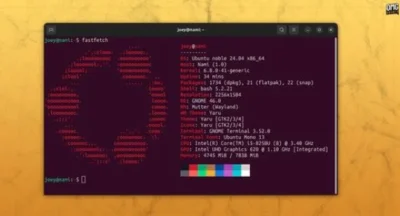
When development on system info tool Neofetch was discontinued1 earlier this year a slew of forks, alternatives, and upstart projects sprung up to fill the void.
Yet the Neofetch alternative that’s gained the most traction —anecdotally, at least; I’ve not be creeping around Linux conferences to verify first-hand—is Fastfetch.
Fastfetch is similar to Neofetch in that it ‘pretty prints’ information about your OS, desktop environment, pertinent underlying technologies, and selected system hardware specs in a terminal window.
But Fastfetch is far more capable than Neofetch: it’s faster, more featured2, supports Wayland (Neofetch technically didn’t), and is actively maintained.
The other thing for people who don’t like change, and still want to be up-to-date and have a supported package, is just install Fastfetch, and use it’s Neofetch compatible output.
When Fastfetch is installed, and you run the generate config file, it will be found in the ~/.config/fastfetch/ folder, and called config.jsonc. All I did was to download the raw version of the file called neofetch.jsonc and copied it over the generated config file (or you could rename it to the same name as the config file). Running Fastfetch now will look just like Neofetch did, but you can still customise that file further if you wish to.
I actually have an alias set in my bashrc file called stats, so all I did was then update that alias to call Fastfetch, and everything worked as it did before.
See https://www.omgubuntu.co.uk/2024/09/fastfetch-is-the-best-neofetch-alternative
Comments